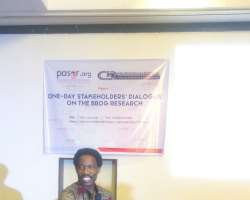Violence: CSO urges political parties support to tackle gender violence.

The Partnership for African Social and Governance Research (PASGR), a civil society organisations,(CSO), has called for collaborative efforts between CSOs and political parties to tackle gender-based violence in Nigeria.
The Executive Director of the PASGR, Prof. Tade Aina, made the call at a one-day Stakeholders’ Dialogue on Bring Back Our Girls (BBOG) in partnership with the Centre for Democracy and Development (CDD) in Abuja.
According to Aina, the centre though in Kenya, works in over 15 countries in Africa carrying out research on excellence in social science studies and decided to research on the BBOG movement in Nigeria.
He said that this was because the BBOG movement was an example of something happening in the world today, an example of a new form of social and political organisation and action.
He said that world over; the social media had been used as pressure groups to fight against the ills in the society, adding that BBOG was a movement, an example of a group that had stood the test of time.
“ The BBOG is a movement fighting for just cause so why are the conventional political parties not interested in the fight.
‘’Is the BBOG a threat to the conventional political practice?
“Why will anybody, whatever your political persuasion is, either on a formal or informal basis, not be part of an attempt to reduce gender violence conflicts?
“We need to join hands to reduce turning the bodies of our women and sisters into battle fields in conflicts, he said.’’
Aina said that this was the singular issue why BBOG was fighting for the release of Chibok girls.
It is not about mobilising to take over political parties, but about mobilising to advance the welfare and the wellbeing of people.
He said that the movement used the social media to mobilise the people from all strata of the society, bringing Christians and Muslims, different tribes to fight the cause.
Aina Said the research carried out by the centre was to know the strengths and weaknesses of the BBOG and how it had survived without being hijacked so other groups could learn form .
“ So we are looking at what is happening to BBOG movement and how members of the group are organising and mobilising beyond the conventional way.
‘’This is necessary so that other countries can learn from the experience.’’ he added.
One of the researchers, Prof. Ayo Ojebode, an Applied Communication expert, Department of Communication and Language Arts, University of Ibadan said that the study was to throw light on the philosophy of the movement.
Ojebode said that the BBOG, like many other movements in the continent, took on a specific societal issue to address and was doing well in the advocacy since 2014.
He said that the essence of the research was to understand what BBOG had been doing, how it is doing it and what impact it had achieved.
This he said was very important for the centre to understand the society and governance and the role of CSOs in advocacy.
“The general verdict is that, BBOG has done fantastic and wonderful things far beyond its own expectations.
Ojebode noted that though all the girls have not returned to their families, the group had been trying in achieving its aims and objectives.
“The movement has also had an unintended impact on people because it is empowering people to find a voice of their own.
“If this it were not a fragile and conflict setting, the group would have succeeded in getting the government to bring back all the girls.
Ojebode called for a stop to abduction in Nigeria, adding that “we want to live like humans.’’
Ms Aisha Yesufu, co-convener of BBOG, said that the group had so far spent 1,518 days in consistently asking for the rescue of the girls.
Yesufu said that the remaining 112 girls had been in captivity for the past 1,533 days.
The group would not rest until the government do the needful and release the Chibok girls and the Dapchi girl, Leah Sharibu, she said.
